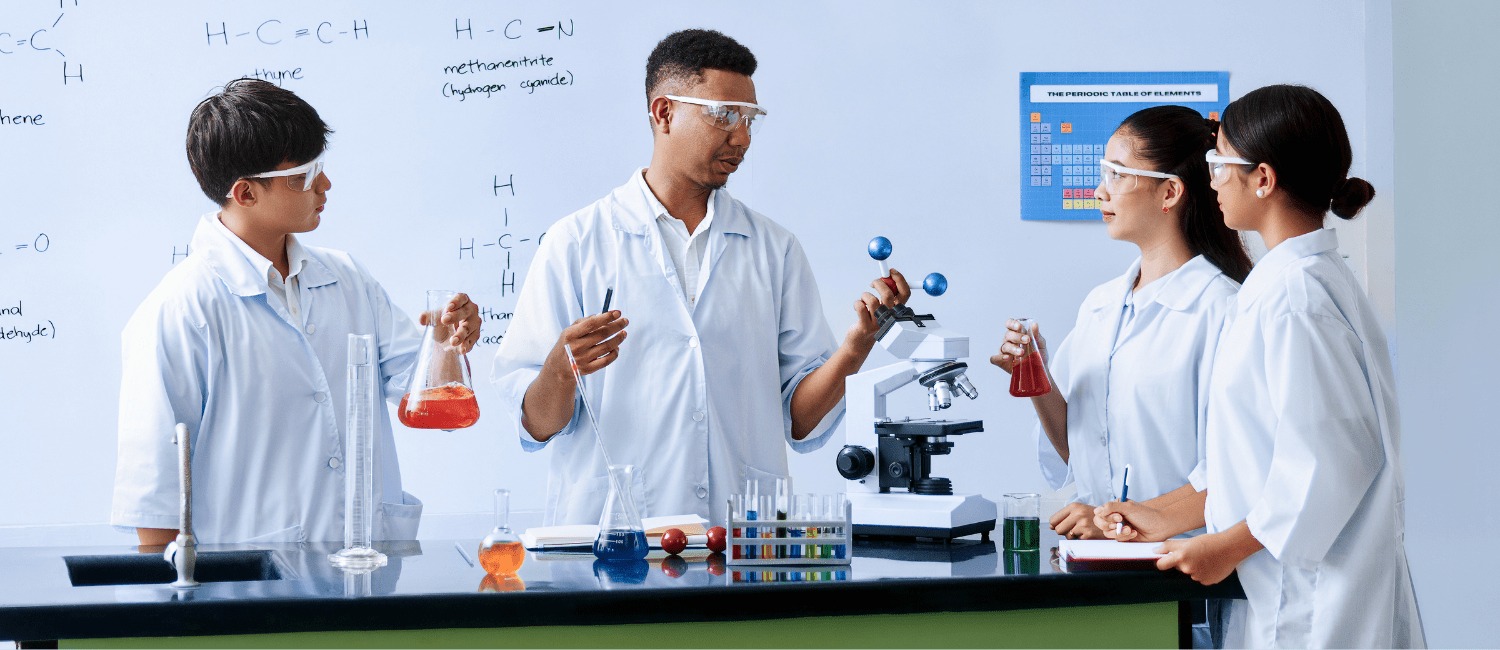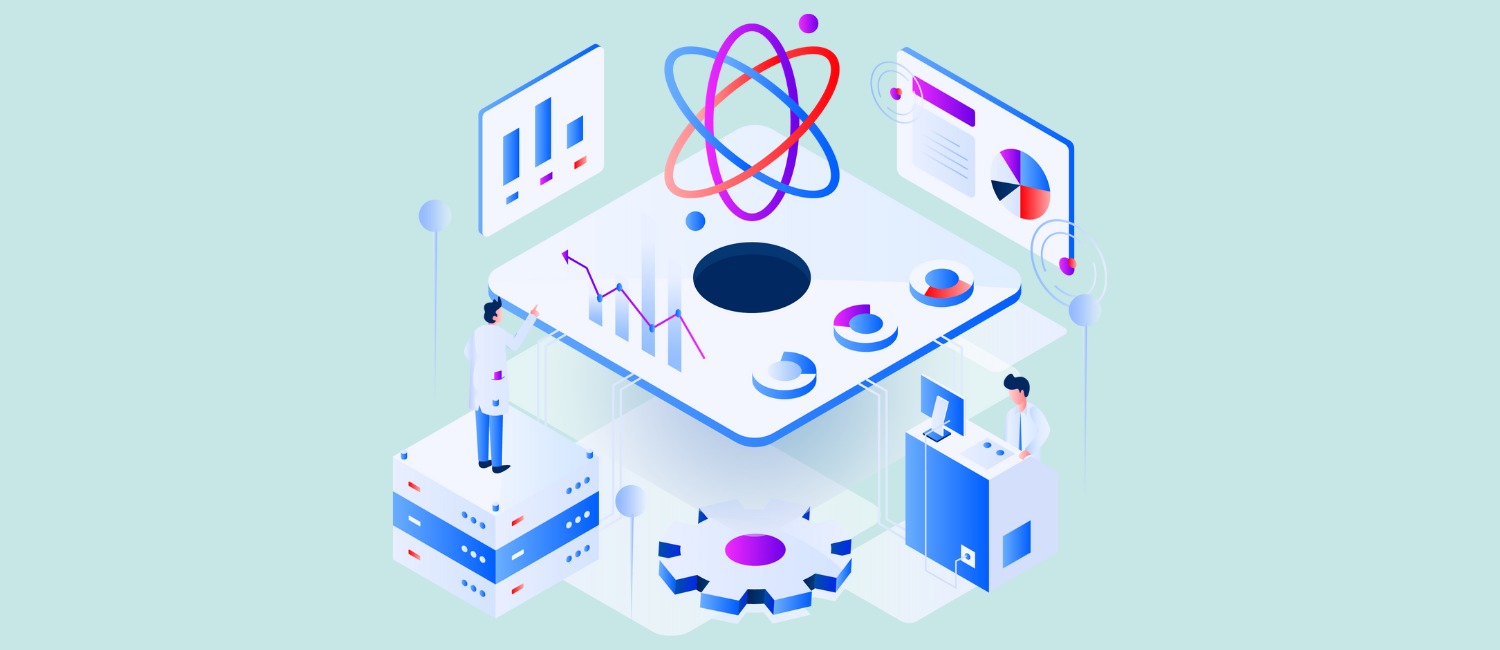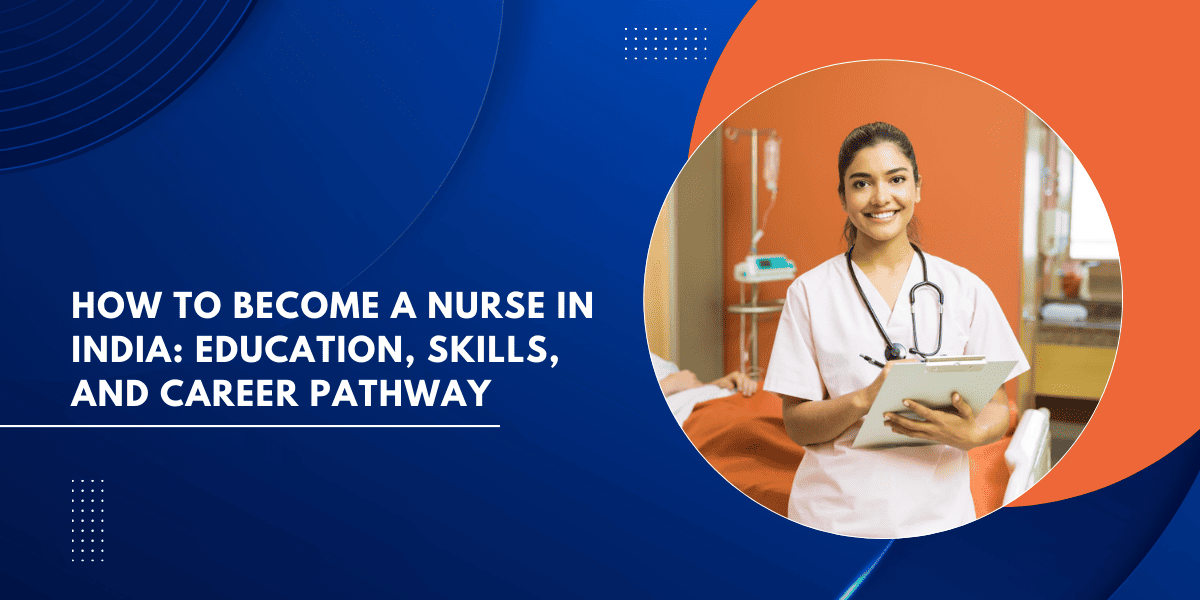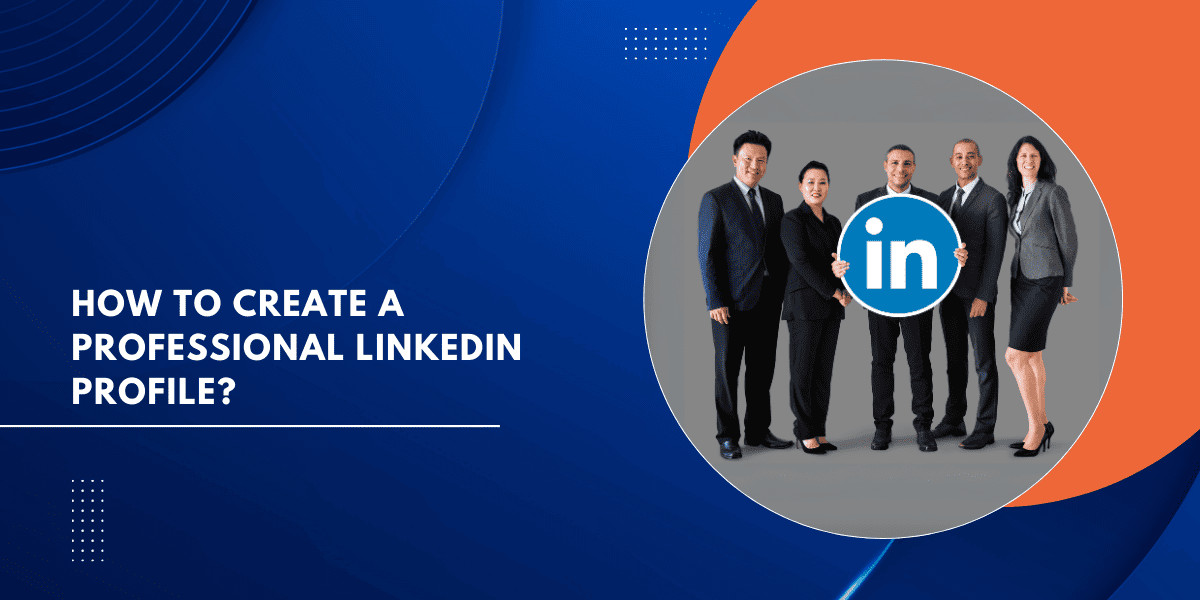A few weeks ago, I was talking to Aarav, a bright-eyed 14-year-old whose eyes lit up when he explained how the human heart pumps blood — complete with diagrams he’d drawn in his notebook. “I want to discover how to fix hearts without surgery,” he said confidently.
His mother, however, wasn’t quite sure where that curiosity would lead.
I see this all the time — children showing early signs of scientific thinking, especially in biology or medicine, while parents wonder what real-world careers exist beyond being a doctor.
Here’s the good news: biomedical science is one of the most exciting, future-ready careers your child can pursue — where passion for biology meets purpose-driven innovation.
In this blog, you’ll discover what biomedical science is all about, the exciting career paths it offers, the skills your child will need, and how global trends are shaping its future — so you can make informed decisions together.
Why Biomedical Career Matters Today?
Biomedical science is where biology meets innovation — and the world needs it now more than ever. From vaccine development to solving genetic disorders and fighting antibiotic resistance, biomedical scientists are the unsung heroes behind many medical breakthroughs.
As a parent, knowing the “why” behind your child’s interest can help you support them in the right direction. Biomedical science is not just a career — it’s a contribution to humanity.
Global Trends Driving the Future of Biomedical Science Careers
As someone who’s worked with countless science-loving students and curious young minds, I’ve noticed one thing—biomedical science is no longer just about working in a lab or becoming a researcher. It’s at the heart of global innovation. From personalized medicine to pandemic preparedness, the world is investing heavily in health tech and biosciences.
As a parent or student exploring this field, it’s important to understand the bigger picture—how global healthcare demands, research funding, and biotech advancements are shaping the future of careers in biomedical science. Let’s take a look at the trends that are opening new doors and redefining what’s possible in this exciting space.
1. Aging Populations Leading to Higher Demand for Disease Research and Healthcare Innovation
Globally, the proportion of individuals aged 65 and older is increasing rapidly. In the United States, for instance, nearly one-quarter of the population (approximately 94.7 million people) will be aged 65 or older in the coming years. This growing elderly population underscores the need for biomedical scientists to develop age-specific treatments and interventions, thereby expanding career opportunities in geriatric research and healthcare innovation.
2. Pandemic preparedness fueling investment in immunology and virology
The COVID-19 pandemic has highlighted the critical importance of being prepared for global health emergencies. According to the Financial Times, the World Health Organization (WHO) has reported that more than 120 countries have backed a landmark treaty aimed at improving global cooperation and access to vaccines, medicines, and diagnostics during future pandemics. This agreement emphasizes the need for robust immunology and virology research to enhance pandemic preparedness.
Such international commitments are driving investments in biomedical research, particularly in the fields of immunology and virology, creating a surge in demand for professionals equipped to tackle infectious diseases.
3. Chronic diseases like diabetes and cancer demanding more research and personalized medicine
Chronic diseases remain the leading cause of death globally, accounting for 7 out of 10 deaths each year. Conditions like diabetes and cancer require ongoing research to develop effective treatments. According to the GlobeNewswire, The personalized medicine market, which tailors medical treatment to individual characteristics, is projected to reach USD 1.00 trillion by 2033, up from USD 546.97 billion in 2024.
This shift towards personalized medicine necessitates biomedical professionals who can integrate genetic, environmental, and lifestyle factors into patient care, highlighting the expanding role of biomedical science in chronic disease management.
4. Global health partnerships pushing for equitable medical solutions in developing nations
Access to quality healthcare remains a significant challenge in many developing countries. The WHO has reported that people in at least 70 countries are being denied crucial medical care due to substantial funding cuts to aid programs. Initiatives like the NeoTest project aim to address such disparities by developing rapid, cost-effective diagnostic tests for conditions like neonatal sepsis, which currently claims between 400,000 to 700,000 infant lives annually (as per Reuters).
These global health partnerships are creating opportunities for biomedical scientists to contribute to equitable healthcare solutions, particularly in resource-limited settings, emphasizing the global impact and responsibility of the biomedical field.
Understanding these global trends is crucial for aspiring biomedical scientists. The convergence of demographic shifts, pandemic preparedness, chronic disease management, and global health equity is shaping a dynamic and impactful career landscape in biomedical science.

Industry Spotlight: Where Biomedical Careers Thrive?
Biomedical science isn’t confined to one lab or one kind of job. It’s a versatile field that branches out into several high-impact industries—each with its own flavour, pace, and potential. Let’s zoom into the top three industries where biomedical careers are making waves.
1. Hospitals & Clinical Research Centres – The Frontline of Innovation
From diagnosing rare conditions to testing life-saving treatments, hospitals and research centres are the epicentre of biomedical breakthroughs. Clinical research scientists, pathologists, and lab technologists work in tandem with doctors to ensure patients get precise, evidence-backed care.
Example: The Tata Memorial Centre in Mumbai runs advanced oncology research labs that support personalised cancer therapies, with biomedical scientists analysing tumour biology and drug response.
Takeaway:
If your child enjoys structured environments, solving real-time problems, and making a tangible difference in patient lives, this setting could be a great fit. It’s ideal for empathetic, detail-oriented learners who are inspired by seeing their work directly help others.
➡️ Next up: Let’s take this precision and purpose into a more fast-paced, corporate space…
2. Pharmaceutical & Biotech Companies – Where Science Goes Commercial
Pharmaceutical giants and biotech startups need biomedical scientists to develop, test, and bring drugs to market. Careers span from quality control to molecular biology research, regulatory affairs, and product development.
Example: Biocon Biologics, based in Bangalore, employs biomedical professionals to develop biosimilars and affordable biologic drugs for diseases like diabetes and cancer—impacting lives globally.
Takeaway:
If your child thrives on innovation, likes systems and project cycles, and wants to be part of large-scale change, this sector offers high growth. Best for analytical, process-driven minds who love science and strategy.
➡️ And if your child’s curiosity is leaning more toward the tech edge of biology… the next industry is a natural leap.
3. Genomics, AI & Health Tech Startups – The Future is Now
Biomedical science is now merging with artificial intelligence, wearable health devices, and genomics to transform preventive care and diagnostics. Careers here include roles like biomedical data analysts, computational biologists, and digital diagnostics developers.
Example: MedGenome, a genomics-driven diagnostics company, uses biomedical data to predict genetic disorders and enable early interventions—making personalised medicine accessible in India.
Takeaway:
This space is perfect for curious, tech-savvy students who love to explore “what’s next.” It suits future-focused, adaptive learners who enjoy data, emerging tools, and building something new from scratch.
Is Biomedical Science in Demand? Global Hiring Trends You Should Know
Wondering if this career really pays off? You’re not alone—and the numbers speak volumes.
According to Market Research Future, the Cell Counting Market is projected to reach USD 16.91 billion by 2032, growing at a CAGR of 7.8% during the forecast period 2023–2032.
Let’s break down what this means for students and parents eyeing this space:
1. Global Demand is Surging in Developed Countries
Countries like the UK, US, Australia, and Canada are actively recruiting biomedical science graduates to fill roles in hospitals, public health labs, pharma companies, and even forensic services. In the UK, the NHS Biomedical Scientist role is listed as a shortage occupation, which means international graduates with the right qualifications are highly sought after.
🧪 This global demand ensures your child’s degree can travel—and open doors to stable, respected jobs overseas.
2. India is Catching Up with Niche Biomedical Roles
In India, hiring is on the rise in clinical trials, molecular diagnostics, biotech startups, and pharma R&D.
For example, companies like Serum Institute of India are expanding their biomedical workforce to support vaccine innovation and global distribution. Startups in Bangalore and Hyderabad are also tapping into fresh talent for bioinformatics and lab analytics.
🧬 This trend shows how India is becoming a launchpad for globally relevant biomedical careers.
3. Diverse Job Roles Beyond the Lab
Biomedical science careers are no longer limited to lab coats and test tubes. Today’s roles include policy research, medical writing, healthcare data analysis, and even science communication and journalism. For instance, biomedical experts are being hired by digital health platforms like Practo and HealthifyMe to translate medical data into actionable user insights.
🧠 If your child loves science but isn’t sure about working in a lab, this flexibility opens many doors aligned with their unique strengths.
From Career Dreams to Real-World Impact—How NextMovez Supports Every Step?
With the biomedical field opening up globally and hiring trends reflecting a strong future, it’s clear that science-loving students have exciting pathways ahead. But with opportunity comes confusion. How do you choose the right course? Which country aligns best with your child’s interests? How do you ensure they don’t just get a degree—but thrive?
That’s exactly where NextMovez comes in.
As a parent or a student, you’re not expected to have all the answers. Career planning can feel overwhelming—but you don’t have to navigate it alone.
What We Do at NextMovez?
- Personalised Career Mapping – We align student interests, aptitude, and personality with emerging science careers like biomedical science.
- Guidance on Global Pathways – From understanding UCAS applications for UK biomedical programs to decoding course options in Australia, the US, and India—we’ve got you covered.
- College Shortlisting & SOP Mentoring – We help students create strong applications that reflect their scientific curiosity and career intent.
- Parent-Student Joint Sessions – Because clarity isn’t just for the child—it’s for the family. We facilitate collaborative discussions that factor in both aspirations and practical considerations.
Why It Matters?
As a career strategist, I’ve seen firsthand how the right guidance at the right time can turn anxiety into clarity—and dreams into action plans. Parents often tell me they just want what’s best, but the system feels like a maze. At NextMovez, we’re the bridge that makes the science career journey structured, supported, and student-centered.
So whether your child dreams of curing cancer, decoding genes, or working at the frontier of biotech—let’s walk that path together.
Emerging Skills to Watch Out For
To truly thrive in biomedical science, students need more than academic excellence—they need versatile, future-ready skills that make them stand out. Here are the key competencies that are becoming non-negotiable in this dynamic field:
1. Critical Thinking & Research Design
Biomedical scientists must evaluate evidence, design experiments, and solve complex health problems. Whether it’s testing a new vaccine or investigating disease patterns, structured thinking is essential.
Example: A student interning in a diagnostic lab may be asked to compare two testing protocols. Critical thinking helps them ask the right questions—Which method is more accurate? Faster? Cost-effective?
Takeaway: If your child loves solving puzzles, asking “why,” and exploring deeper causes, this skill will be their superpower in research and diagnostics.
2. Data Literacy (Excel, R, Python)
Biomedical research generates mountains of data. Knowing how to organize, analyze, and interpret this data is crucial.
Example: From tracking disease outbreaks using R to modeling protein structures using Python, coding and data visualization tools turn raw data into life-saving insights.
Takeaway: Students who enjoy math, logic, or working with tech will find data literacy a key that unlocks cutting-edge roles in bioinformatics and computational biology.
3. Communication Skills for Presenting Findings
Great discoveries only make an impact when they’re shared effectively—whether in journals, conferences, or media.
Example: A young biomedical student presents their summer project on antibiotic resistance at a school science fair, and later adapts the same presentation for a public awareness video. That’s real-world communication in action.
Takeaway: If your child is expressive, enjoys storytelling, or even has an interest in digital content, this skill can take them from the lab to the TED stage.
4. Interdisciplinary Knowledge
Today’s breakthroughs happen at the crossroads of disciplines. Biomedical science now blends biology with AI, physics, engineering, and more.
Example: Developing a wearable glucose monitor isn’t just biology—it requires understanding sensors (physics), circuitry (engineering), and user interface design (tech).
Takeaway: Students who love mixing subjects, tinkering with devices, or jumping across science streams will find this fusion field both exciting and full of potential.
5. Ethical Decision-Making
With CRISPR, genetic editing, and AI in diagnostics, biomedical scientists face complex ethical questions. What should we do—not just what can we do?
Example: In clinical trials, deciding how to balance patient safety, informed consent, and scientific goals is a daily challenge that demands strong ethical grounding.
Takeaway: If your child has a strong sense of fairness, is empathetic, or often asks “what’s right?”—they’ll bring integrity and thoughtfulness to every discovery.

Future Outlook and Predictions
The world of biomedical science is just getting started. From personalized medicine to AI-powered diagnostics, the future is teeming with innovation and impact.
1. Rise of Precision Medicine
By 2030, treatments will increasingly be tailored to individuals based on their genes, lifestyle, and environment. Biomedical scientists will play a huge role in making this a reality. Careers will emerge in genomics, bioinformatics, and personalized drug development—fields that didn’t exist a decade ago.
2. Integration of AI & Machine Learning
AI is transforming how we detect, diagnose, and treat diseases. Biomedical professionals are now partnering with data scientists to create smart healthcare tools. There will be hybrid roles—think biomedical analyst or AI-health systems designer—that merge clinical insights with tech skills.
3. Global Health & Pandemic Preparedness
COVID-19 was a wake-up call. Governments and international organizations are investing heavily in biomedical R&D to prevent future outbreaks. Careers in public health biology, epidemiology, and infectious disease surveillance will grow—especially in developing countries and underserved areas.
4. Regenerative Medicine & Stem Cell Therapy
Advances in stem cell research could lead to breakthroughs in healing damaged organs, treating neurological disorders, and even reversing aging. Students entering the field now may be at the forefront of creating lab-grown organs or curing chronic diseases once thought untreatable.
5. Demand for Ethics & Policy Experts
As technology races ahead, ethical debates around gene editing, clinical trials, and patient data privacy are intensifying. There will be a growing need for professionals who understand both science and policy to guide regulation and public communication.
Takeaway: If your child is curious, adaptable, and motivated by purpose—not just pay—they’ll thrive in this field. Biomedical science isn’t just a job; it’s a chance to shape the future of human health.
Encourage your child to think boldly. The breakthroughs of tomorrow will belong to those who blend heart, science, and vision. Whether they’re decoding DNA or designing the next wearable health tech, their work can truly change lives.
What This Means for Aspiring Professionals?
If your child is a science enthusiast, help them explore early:
- Enroll in foundational courses like biology, chemistry, and math
- Explore programs like B.Sc. in Biomedical Science, Biotechnology, or Life Sciences
- Look out for summer schools or STEM workshops offered by reputed colleges
- Encourage them to follow real-world biomedical research (try TED Talks, research journals, or YouTube science explainers!)






















